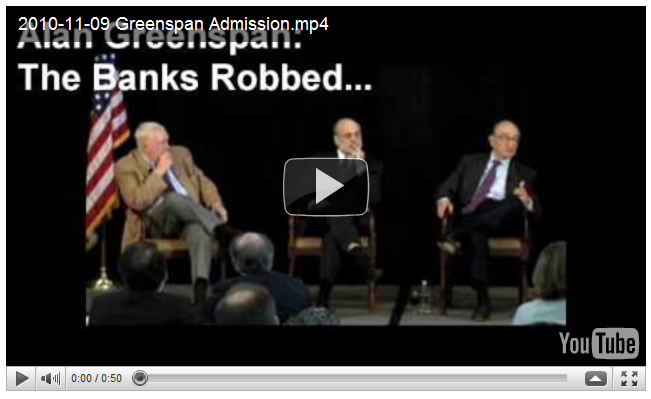Results 1 to 1 of 1
Thread Information
Users Browsing this Thread
There are currently 1 users browsing this thread. (0 members and 1 guests)
-
12-14-2010, 08:37 PM #1Senior Member


- Join Date
- May 2007
- Location
- South West Florida (Behind friendly lines but still in Occupied Territory)
- Posts
- 117,696
US Economy is A Giant Ponzi Scheme, Prosecuting Wall Street
The US Economy is A Giant Ponzi Scheme, Prosecuting Wall Street Fraud
Politics / Credit Crisis 2010 Dec 14, 2010 - 09:53 AM
By: Washingtons_Blog
Bill Gross, Nouriel Roubini, Laurence Kotlikoff, Steve Keen, Michel Chossudovsky and the Wall Street Journal all say that the U.S. economy is a giant Ponzi scheme. Virtually all independent economists and financial experts say that rampant fraud was largely responsible for the financial crisis. See this.
But many on Wall Street and in D.C. - and many investors - believe that we should just "go with the flow". They hope that we can restart our economy and make some more money if we just let things continue the way they are.
But the assumption that a system built on fraud can continue without crashing is false.
In fact, top economists and financial experts agree that - unless fraud is prosecuted - the economy cannot recover.
Fraud Leads to a Break Down in Trust and Instability in the Markets
As Alan Greenspan said recently:
Fraud creates very considerable instability in competitive markets. If you cannot trust your counterparties, it would not work

Video: 2010-11-09 Greenspan Admission
http://www.youtube.com/watch?v=731G71Sa ... r_embedded
Similarly, leading economist Anna Schwartz - co-author of the leading book on the Great Depression with Milton Friedman - told the Wall Street journal in 2008:
"The Fed ... has gone about as if the problem is a shortage of liquidity. That is not the basic problem. The basic problem for the markets is that [uncertainty] that the balance sheets of financial firms are credible."
So even though the Fed has flooded the credit markets with cash, spreads haven't budged because banks don't know who is still solvent and who is not. This uncertainty, says Ms. Schwartz, is "the basic problem in the credit market. Lending freezes up when lenders are uncertain that would-be borrowers have the resources to repay them. So to assume that the whole problem is inadequate liquidity bypasses the real issue."
***
Today, the banks have a problem on the asset side of their ledgers -- "all these exotic securities that the market does not know how to value."
"Why are they 'toxic'?" Ms. Schwartz asks. "They're toxic because you cannot sell them, you don't know what they're worth, your balance sheet is not credible and the whole market freezes up. We don't know whom to lend to because we don't know who is sound. So if you could get rid of them, that would be an improvement."
And economics professor and former Secretary of Labor Robert Reich wrote in 2008:
The underlying problem isn't a liquidity problem. As I've noted elsewhere, the problem is that lenders and investors don't trust they'll get their money back because no one trusts that the numbers that purport to value securities are anything but wishful thinking. The trouble, in a nutshell, is that the financial entrepreneurship of recent years -- the derivatives, credit default swaps, collateralized debt instruments, and so on -- has undermined all notion of true value.
Robert Shiller - one of the top housing experts in the United States - said recently that failing to address the legal issues will cause Americans to lose faith in business and the government:
Shiller said the danger of foreclosuregate -- the scandal in which it has come to light that the biggest banks have routinely mishandled homeownership documents, putting the legality of foreclosures and related sales in doubt -- is a replay of the 1930s, when Americans lost faith that institutions such as business and government were dealing fairly.
Nobel prize-winning economist Joseph Stiglitz says about the failure to prosecute Wall Street fraud:
The legal system is supposed to be the codification of our norms and beliefs, things that we need to make our system work. If the legal system is seen as exploitative, then confidence in our whole system starts eroding. And that's really the problem that's going on. *** I think we ought to go do what we did in the S&L [crisis] and actually put many of these guys in prison. Absolutely. These are not just white-collar crimes or little accidents. There were victims. That's the point. There were victims all over the world. *** Economists focus on the whole notion of incentives. People have an incentive sometimes to behave badly, because they can make more money if they can cheat. If our economic system is going to work then we have to make sure that what they gain when they cheat is offset by a system of penalties.
Wall Street insider and New York Times columnist Andrew Ross Sorkin writes:
âThey will pick on minor misdemeanors by individual market participants,âJoin our efforts to Secure America's Borders and End Illegal Immigration by Joining ALIPAC's E-Mail Alerts network (CLICK HERE)


 LinkBack URL
LinkBack URL About LinkBacks
About LinkBacks




 Reply With Quote
Reply With Quote

CRISIS: IS IRELAND ON THE BRINK OF A REVOLUTION OVER FORCED...
05-06-2024, 09:48 PM in Videos about Illegal Immigration, refugee programs, globalism, & socialism